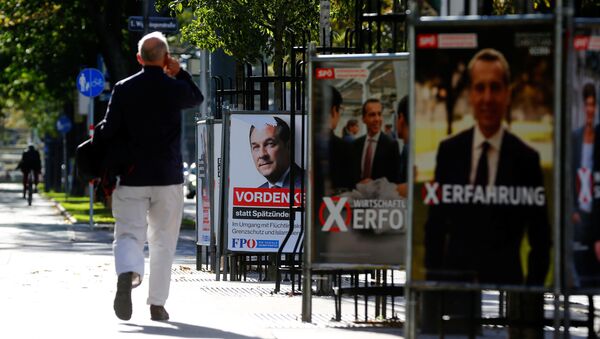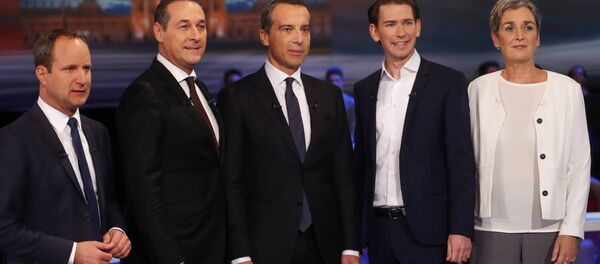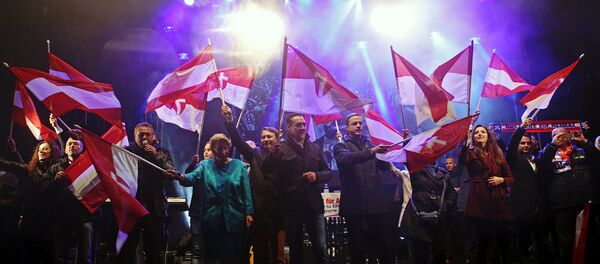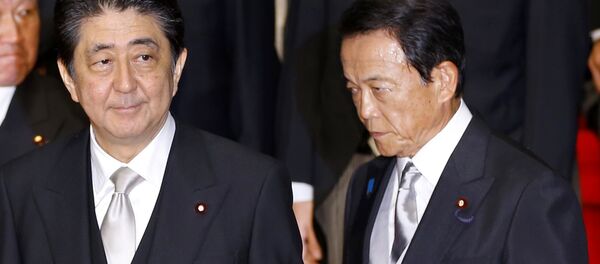MOSCOW (Sputnik) — The election in Austria, scheduled for this Sunday, will determine the composition of the National Council, the lower house of the country’s parliament where the Freedom Party of Austria (FPO) currently holds 38 out of 183 seats. The Social Democratic Party of Austria (SPO) and the Austrian People's Party (OVP) have 51 seats each, the Green Party has 21, The New Austria and Liberal Forum (NEOS) has eight seats. The National Council also includes 14 independent lawmakers.
Austria is currently governed by the Grand Coalition of the SPO and the OVP.
Potential Coalitions in Austria
Werner J. Patzelt, a professor at the Technical University of Dresden, pointed out the difference between the potential coalition-building decisions of Christian democracy parties — the OVP in Austria and the union of the Christian Democratic Union of Germany (CDU) and the Christian Social Union in Bavaria (CSU) in Germany.
"In Austria, the Christian Democrats… will presumably win the election and then form a coalition with the FPO. In Germany, the AfD is resented by all established parties. As a result, the Christian Democrats will try to establish an innovative coalition between the CDU/CSU, the Liberals, and the Greens," Patzelt told Sputnik.
Anton Pelinka, a professor of Political Science and Nationalism Studies at the Central European University, told Sputnik that the coalition would definitely include two of the three major parties, the SPO, the OVP or the FPO. According to Pelinka, the OVP currently appears likely to find itself in a position of power after the election, able to choose a partner.
Dr. Eva Zeglovits with the Institute for Empirical Social Research (IFES), suggested, based on polls data, that a coalition between the OVP and the FPO was highly likely.
"The OVP and the FPO: highly likely, as their agenda is rather similar. The OVP and the SPO: unlikely, as they had been in a coalition before the snap elections. People would not understand why these two should work together again, after it obviously had not worked out earlier," Zeglovits told Sputnik.
The coalition between the SPO and the FPO is less likely than the one between the OVP and the FPO, but nevertheless possible, according to the expert.
Wolfgang Bachmayer, the OGM CEO, told Sputnik that the most likely coalition was the one between the OVP and the FPO.
Same Right-Wing Label, Different Stories
According to Jean-Yves Camus, a political analyst with the French Institute for International and Strategic Affairs (IRIS), the two right-wing parties have a very different standing in their respective countries — Austria’s FPO is fairly mainstream, while Germany’s AfD is more of a political outlier.
"In Austria, the FPO is seen as a Right-Wing, Populist Party. It has been a coalition partner of both the Social Democrats and the Conservative OVP. The political spectrum in Austria traditionally consists of three families: the Christian Democrats, the Social Democrats and the National-Liberal, this one being represented by the FPO. That means that the FPO is not a fringe party but a mainstream one, whereas in the German context, the AfD is still seen as not acceptable," Camus told Sputnik.
Both Austria and Germany have "a strong right-wing populist party, giving voice to those citizens who refuse further power sharing by the Christian Democrats and the Social Democrats," according to Patzelt, but the FPO has a longer history and has been part of a ruling coalition in the past.
"The FPO stands in unbroken tradition of national-liberalism, i.e. the anti-clerical German-nationalist camp in Austria. Its German counterpart has been the [Free Democratic Party] FDP until the 1960s. Then, this tradition line was cut in Germany, and re-emerged only with the rise of the AfD (as a reaction to Euro- and immigration policy, both – as it seemed to a part of the population – doing harm to German national interests)," Patzelt said.
Meanwhile, the AfD was formed in 2013 and failed to enter the German parliament at the election held that year. The party has been doing well in regional elections, securing seats in the parliaments of more than half of the federal states.
According to Patzelt, the AfD is "a new and still unstable party without significant political experiences and, presumably, even without political skills."
Vienna Right vs Berlin Right
The AfD and the FPO may have similar programs on some issues, including immigration, but, according to experts, the FPO’s ideas are more moderate and do not clash with the rest of the Austrian political scene as heavily as the AfD program in Germany.
"They are right wing parties, but they have not so much in common as left wing parties say. The AfD is extreme right, the FPO moderate right with a number of 'left' social issues in their program," Bachmayer said.
Bachmayer explained that Germany’s right-wing CDU/CSU have shifted to the left, creating an opening on the right, while in Austria the two coalition parties moved to the right, leaving an open space on the left.
However, according to Camus, a potential OVP-FPO alliance, while a right-wing coalition, would not pursue an extreme-right agenda, judging by the example of such a union in 2000.
FPO leader Heinz-Christian Strache congratulated the AfD on the success in the parliamentary election, but noted that his party did not necessarily support the solutions suggested by the AfD, even if it identified the same challenges.
Immigration, Integration
Immigration and religion (Islam, in particular) will be the only two issues where the FPO, calling for the halt of mass immigration, can make a real impact, but it is not the only Austrian party to consider harsher positions on these issues, according to the experts.
"The OVP will probably, if elected, push for stricter anti-immigration policies but the Social-Democrats have also changed their mind on some issues: the present cabinet led by Christian Kern has just adopted a ban on the full-face veil and the burka," Camus said.
Zeglovits also pointed out that the rule of the SPO-OVP coalition had resulted in some tougher policies on migrants and their integration. Interior Minister Wolfgang Sobotka, a member of the OVP, oversaw the implementation of a stricter border control in August and spoke in favor of the prolongation of more rigorous border checks within Europe's visa-free Schengen Area in September.
"There might be some changes in education policies (e.g. separate classes for children who do not speak sufficient German), if the OVP/ [led by Foreign Minister Sebastian] Kurz and the FPO form a coalition, or in social benefits (less for migrants). The point is, the FPO and the OVP/Kurz rather agree on the positions towards migrants, thus it is less what the FPO wants (they have wanted things like this for decades), but how far the OVP goes," Zeglovits said.
Patzelt suggested that Austria’s efforts to limit immigration would continue after the election.
In Germany, Angela Merkel, the leader of the CDU/CSU union, initially adopted a welcoming policy toward migrants and refugees, in stark contrast with AfD’s program. However, Merkel confirmed on Monday that the CDU and the CSU reached agreement on a refugee cap, a contentious issue in the talks on the formation of a ruling coalition.
Far-Right Future
Camus said that a potential FPO government in Austria would result in a "short-lived outcry in Brussels … then it will become back to normal."
Patzelt said that the European Union would not react the same way it did after the 1999 Austrian election, when it imposed sanctions on Vienna over the formation of the coalition government with the FPO.
"Nothing of this kind is to be expected after the coming elections and coalition formation. Since the overall political climate in the EU has changed, nothing particular will happen," Patzelt said.
According to Bachmayer, the upcoming election in Austria and potential OVP-FPO alliance would "open more doors to similar government coalitions in other European States."
For the moment, however, the AfD in Germany will remain in opposition as the CDU/CSU is attempting to set up an alliance with the Free Democrats (FDP) and the Greens.







